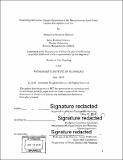Promoting alternative dispute resolution in the Massachusetts Land Court : current perceptions and use
Author(s)
Kahveci, Alexandra Elizabeth
DownloadFull printable version (4.263Mb)
Other Contributors
Massachusetts Institute of Technology. Department of Urban Studies and Planning.
Advisor
Lawrence Susskind.
Terms of use
Metadata
Show full item recordAbstract
The Massachusetts Land Court is overburdened. More than 15,000 new cases are filed each year, with the even more cases carried over from previous years. Each emotionally taxing case can cost litigants between $50,000- $150,000 to try, with no guarantee of winning. One promising option that would relieve the overload, reduce the cost to litigants, and give them control over the outcome is Alternative Dispute Resolution (ADR). This is an approach to resolving disputes that allows parties to find mutually beneficial agreements with the help of a neutral mediator. The Land Court already has an ADR program - and has since 1999. But the program is underutilized and it is not clear why that is the case. Despite unanimous support for ADR among mediators, Land Court judges, and attorneys, less than 1% of cases that go through the Court are mediated. I find that the Massachusetts Land Court ADR program is perceived as "second-class justice" - less desirable than a trial. A lack of understanding about ADR and its value, a perception that the costs of mediation not worth the service, and emotional factors emerged as the key barriers to wider use of mediation in Land Court cases. I make recommendations for each of the involved parties. For the courts, I recommend reinstating an in-court ADR program (rather then sending cases to external mediators) and giving judges and clerks more responsibility for addressing litigants' misperceptions of ADR. For legislators, I recommend increasing ADR-specific funding for the Land Court. For attorneys, I suggest ensuring that all of their clients fully understand how ADR can improve their prospects, and bringing their clients with them to case management conferences or a similar court-tracked meeting. And lastly, for mediators, I recommend providing in-court screening of cases for the possibility of mediation and establishing long-term professional relationships with judges. Thesis
Description
Thesis: M.C.P., Massachusetts Institute of Technology, Department of Urban Studies and Planning, 2018. Cataloged from PDF version of thesis. Includes bibliographical references (pages 53-57).
Date issued
2018Department
Massachusetts Institute of Technology. Department of Urban Studies and PlanningPublisher
Massachusetts Institute of Technology
Keywords
Urban Studies and Planning.